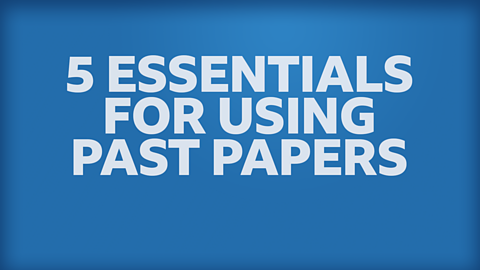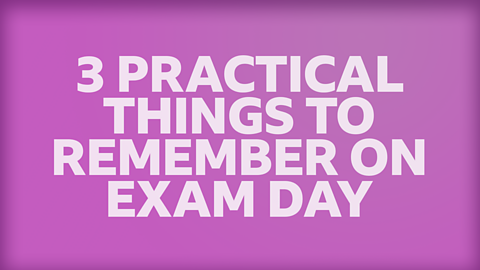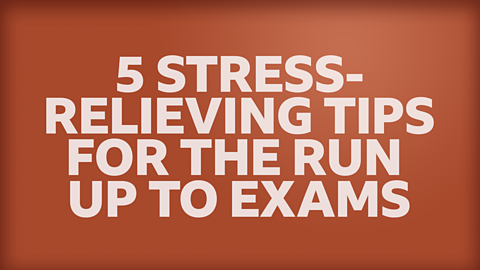We've all had that moment when we're doing coursework and we find that perfect quote online to back up our argument, but there are a few things we should check before including it in an essay or exam.
We've asked our exam survivors for their advice when checking the validity of an online source. Watch the short video, then read a recap of the tips below.
Daachi: I've got some expert tips for checking online sources for coursework.
Amiga: I'm ready.
Amy: Places to go for your coursework sources, books in the library. Yes. Some sources provided by our teachers. Yes. Some weird site online. No.
Dylan: You need to question what you're looking at and if it's legit.
**Amy:**Do you recognise the website? It's good to start with websites your teachers have recommended at the start of the course, sometimes, there are established organisations like universities or scientific bodies or publishers. I know that when I was looking for sources for my psychology exam I looked all around and I found information, but it didn't exactly match what I was studying. So I took it to my teacher and he actually said that I had the wrong one for the wrong exam board. So it's important to check because otherwise, I would have been studying for something that wasn't even on the paper.
Dylan: It's not a good idea.
Amy: No. OK, next question.
Dylan: Who was it written by?
Daachi: Look at the author. Is an actual person named or is it just a of jungly words written by a robot? If it's not clear, stay clear.
Amiga: A good source for your coursework is probably not something a random person posted on the internet. Some sites are written by several people and can be edited by anyone in the world. Probably best to avoid those ones.
Dylan: You can also get warning signs that something isn't right. If you don't know who a site is written by and the site starts asking you for lots of personal information before giving you a free resource, I wouldn't trust it.
Amiga: Ok, what else?
Daachi: Is the author trustworthy and reliable?
Amy: Have a look at other stuff the author has written. Are they consistent? Do they put forward good, clear arguments? Are they experts, or just randoms? If in doubt, ask your teacher.
Amiga: Especially in subjects like English. Some authors might quote things from another book or another source. Sometimes they might twist those revision words or misinterpret them. Make sure you check the original source.
Daachi: Next question
Amiga: Is it out of date?
Amy: Check the date of the article. Make sure it's still relevant.
Dylan: Yeah. If a source is ancient then that's probably not going to fit in the current curriculum, but it depends on the subject. So, for history or English literature some old sources might be perfectly fine.
Amy: Yeah. It's always good to check.
Amiga: Anything that predates me is ancient.
Daachi: You said you love Shakespeare and Christmas Carol, they're ancient!
Amiga: Just make sure the date is right for the information it's giving. Make sure you know what the best updated sites and articles are. Again, your teacher will help.
Daachi: And make sure the date is right for the information it's giving, like if an article's about computers, but it's dated 1456 something's not right.
Amy: OK, last question
Dylan: Is it biased?
Amy: Bias is something important in some of the subjects that I did like media, psychology and English. They're very opinion based. So you're looking at opinions and you have to present your own balanced argument based on them. So you really have to be careful about sources that are one sided or biased.
Amiga: When you're looking on websites for coursework sources ask yourself, do you recognise the website? Who is it written by? Is the author trustworthy and reliable? Is it out of date? Is it biased?
Daachi: You should always use several sources to cross reference your information. Hang on, for this video, do we have to cross reference ourselves?

How do I check online sources for my coursework?
When doing coursework, it's important to check that you're getting information from legitimate sources, especially when we're using the internet for research. So let's dive into some questions you can ask yourself to make sure you know your facts from your fakes.
Do you recognise the website? Good coursework sources include trustworthy websites recommended by teachers which can include universities, scientific bodies and publishers… and Bitesize! You could also use books from the library and literature provided by your teacher. Remember, if you think the website looks a bit fishy when using the internet as a source, then it's probably best to steer clear.
Who was quote written by? Look at the author, is it an actual person, like Professor Brian Cox or a username like HistoryBuff123? A good source for your coursework probably isn't one that's written by some random person on an internet forum. Remember, some websites can be edited by anybody in the world – it's probably a good idea to avoid those ones. If you're unsure whether or not a source is reliable, as your teacher for advice.
Is the author reliable and trustworthy? Once you've found what you think is a good quote, you can check the reliability of the author by looking at their other work. Are they consistent? Do they regularly put across good arguments? Are they experts in their subject? Some authors might quote other books or sources, so make sure you check the original source. Ask your teacher if you want further clarification.
Is the information out of date? You should always look at the date the information was published. Is it the most up-to-date thinking on the subject? For some subjects, like history or English literature, older sources might be fine. But a source from twenty years ago in a piece of IT coursework might be out-of-date. It's always good to check with teachers if you're unsure.
Is the source biased? Bias can show preference to one argument or another. This is important in some opinion-based subjects like English, media or psychology. If you use sources from both sides of the argument you'll make sure that your coursework is well-rounded. For more information on bias, check out Other Side of the Story

If you want some more useful exam tips and guidance, then we've got loads of amazing advice to help guide you through exam season on the pages below, what are you waiting for? Give them a tap!

If you need support
You should always tell someone about the things you’re worried about. You can tell a friend, parent, guardian, teacher, or another trusted adult. If you're struggling with your mental health, going to your GP can be a good place to start to find help. Your GP can let you know what support is available to you, suggest different types of treatment and offer regular check-ups to see how you’re doing.
If you’re in need of in-the-moment support you can contact , where you can speak to a counsellor. Their lines are open 24 hours a day, 7 days a week.
There are more links to helpful organisations on ±«Óătv Action Line.

5 essentials for using past papers
Find out what our exam veterans have to say about all things past papers and discover the benefits of using them.

3 practical things to remember on exam day
On the run-up to exams, we can get so worked up with revision that we can sometimes forget a few simple, but quite important, practical things about the big day. Our exam veterans give us their top tips.

5 tips to help you relieve stress in the run-up to exams
If you're finding exam season more stressful than a trip to the dentist, the final boss on your favourite computer game or even a sudden-death penalty shoot out in the cup final, then... try and relax – we've got some tips that will help you.
